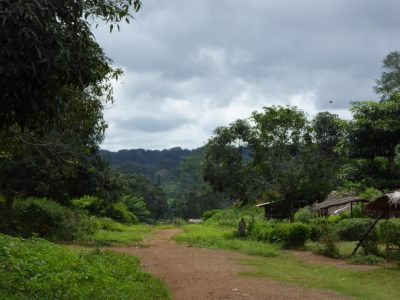“Without Our Forest, We Have No Life, We Disappear”: Cameroon’s Baka Community

*Jean-Jacques, a member of one of Cameroon’s Baka Communities in the Ngoyla Mintom area, talks about being driven out of his ancestral forests, and the issues his people face on a daily basis through lack of land rights and lack of access to food, medicine and education.
***
“Life in my Baka community is getting harder and harder. We live mostly from the resources of the forest, and with our forest is increasingly exploited by foresters, and as the state continues to create national parks and reserves, the forest no longer provides us with enough food and medicinal plants. With the introduction of heavy forestry equipment, the game animals have disappeared. Poverty has become established, and we must convert ourselves into farmers, where again we face serious problems linked to land conflicts and lack of land. Our Bantu neighbours hold all the lands. Our rights of use of the forest, land and natural resources are ignored.
“We are a sharing community, and we try to share what we find in the forest to eat. During certain times of the year there is still enough food (wild mango, mushrooms, wild yams, rats, fish, leaves and roots). Since our community is growing, we divide into groups to go camping in the middle of the forest to stock up on food. During these trips, families eat well.
“Every Baka depends and continues to depend on the forest. It is she who makes our identity…She is our soul, without it we have no life, we disappear.”
“But our rights of use of the forest are being prohibited by conservation projects and state services.
“Every Baka depends on, and will continue to depend on, the forest. It is she who makes our identity. All our resources come from her: fruit, leaves, honey, meat, fish, medicinal plants. All our sacred trees, cultures and other traditional rites are practiced in the heart of the forest. God made us the guardians of the forest. She is our soul, without her we have no life, we disappear. This right to worship and to partake in our traditional rituals is increasingly being ignored.
“By driving us out of the forest to make us settle on the side of the roads next to the villages, everything in our community has changed. Our future has been sealed by the public authorities on the basis of an economic and political choice. Our expulsion from the forest has disrupted our lives. There is a real loss of value in our community. Individualism is gaining more and more ground, to the detriment of solidarity and sharing. Healers are losing their knowledge of plants. Generational conflicts, marginalization and poverty have become common. We are facing a great challenge for our survival. All these changes came with the socio-economic and political issues of the day. This right to life is also violated by the public authorities.
“My community works the land, but on a small scale. It must be emphasized that we are not farmers by nature, but hunter-gatherers. Many of us are not yet adapted to the lifestyle of farmers; with the depletion of the resources of the forest and especially because of not being able to freely access the forest, we are obliged to look for other means of survival. There is increasing pressure on my community’s access to land, natural resources and the right to development.”
The main problems we see today in my community are:
- Lack of Citizenship of the Cameroonian State;
- Lack of a civil status centre to enable us to enjoy our fundamental rights as citizens as all the rest of the Cameroonian population;
- Lack of indigenous public institutions;
- Discrimination in society, in employment and in occupations;
- Lack of access to appropriate education and lack of schools at all levels;
- Lack of consultation and participation in the management of public affairs;
- Marginalization in our access of public services;
- Lack of access to social and economic development;
- Lack of access to justice;
- No access of our young people to employment because of our status as “Pygmies”;
- Illiteracy of the indigenous population;
- Land conflicts with our Bantu neighbours and agro-industrialists;
- Lack of useable land for the fields and buildings of our houses;
- Lack of primary health services;
- Violence, detention and arrest, search and torture by ‘eco-guards’ and protected-area officials;
- Prohibition to practice our traditional activities of survival in the forest, which has become a protected area.
*
Note to readers: please click the share buttons above. Forward this article to your email lists. Crosspost on your blog site, internet forums. etc.
Note
*Name changed for security purposes.
Featured image is from FPP.

